|
|
|
Sort Order |
|
|
|
Items / Page
|
|
|
|
|
|
|
| Srl | Item |
| 1 |
ID:
139436


|
|
|
|
|
| Summary/Abstract |
Cambodia has recently demonstrated one of the highest rates of deforestation in the world. While scholars have long explored the drivers of tropical forest loss, the case of Cambodia offers particular insights into the role of the state where transnational governance and regional integration are increasingly the norm. Given the significant role logging rents play in Cambodia's post-conflict state formation, this article explores the contemporary regime and its ongoing codependent relationship with forested land. Insights are distilled from comparative analysis of illicit logging in two ethnographic case studies. Both involve foreign investments by state-owned companies – a Chinese-backed hydropower dam and Vietnamese-owned rubber concessions – and both are nestled in prominent conservation landscapes that are managed with international donor support. Together, the cases reveal how Cambodia's current timber extraction regime works through the use and abuse of legal mechanisms associated with forest conservation and foreign investment projects, and the mobilization of elite alliances that log both for private gain and in service of the ruling party's interests. By implication, the government's remarkable facilitation of transnational projects for conservation and development must be reappraised and ultimately seen as constitutive of a predatory and extractive regime that continues to rely heavily upon illicit logging revenues.
|
|
|
|
|
|
|
|
|
|
|
|
|
|
|
|
| 2 |
ID:
079962
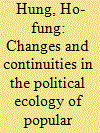

|
|
|
|
|
| Publication |
2007.
|
| Summary/Abstract |
This article will delve into the historical roots of Chinese environmentalism. A wave of recent research has unearthed numerous instances of Chinese state-society conflicts, as well as the ecological crisis precipitated by drastic population and commercial growth in 18th-century China. Based on a survey of protest events derived from archival sources, this contribution analyzes how the mounting ecological crisis and falling capacity of the Qing state in the 18th and 19th centuries generated changing forms of popular protests as responses to the "externalities of development." It is found that when the Qing's regime capacity peaked in the early 18th century, most popular protests were peaceful and were resolved through compromises between officials and protesters. Amid the administrative breakdown in the 19th century, however, many protests escalated into violent confrontations, while others developed into "appeals to the capital" (jingkong ), a litigation process that enabled local communities to seek the support of the central government in their struggle with predatory local officials. Remarkably, some repertoires and patterns of environmental protests in contemporary China can be traced back to the Qing times, which raises questions about whether today's environmental protests are completely novel, or whether certain continuities are inherent in the deep-seated tradition of state-society conflict and negotiation in China's late imperial history
|
|
|
|
|
|
|
|
|
|
|
|
|
|
|
|
| 3 |
ID:
166772
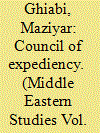

|
|
|
|
|
| Summary/Abstract |
Giorgio Agamben argues that in contemporary governance the use of ‘emergency’ is no longer provisional, but ‘constitutes a permanent technology of government’ and has produced the extrajudicial notion of crisis. The engendering of ‘zones of indistinction’ between the law and its practice is what Agamben defines as a ‘state of exception’. This article adopts the notion enunciated by Agamben and revisits it in the Islamic Republic of Iran. There, the category of crisis has been given, firstly, a juridical status through the institution of maslahat, ‘expediency’, interpreted in a secular encounter between Shica theological exegesis and modern statecraft. Secondly, crisis has not led to the production of a ‘state of exception’ as Agamben argues. Instead, since the late 1980s, a sui generis institution, the Expediency Council, has presided and decided over matters of crisis. Instead of leaving blind spots in the production of legislative power, the Expediency Council takes charge of those spheres of ambiguity where the ‘normal’ – and normative – means of the law would have otherwise failed to deliver. This is a first study of this peculiar institution, which invites further engagement with political phenomena through the deconstruction and theorization of crisis politics.
|
|
|
|
|
|
|
|
|
|
|
|
|
|
|
|
| 4 |
ID:
141136
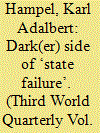

|
|
|
|
|
| Summary/Abstract |
Scholars concerned with the formation of states, specifically the relationship between state formation and war, hold one of two positions. Some agree with Charles Tilly’s historiological conclusion that war is decisive for the establishment of stateness and specify key concepts, in order to explain presumed discrepancies between past and present. Others point towards the international sphere in its current form and advocate a ‘war breaks states’ perspective. This paper argues that both standpoints neglect the ‘sub-national’ level. While proponents of the ‘war breaks states’ thesis are missing para-sovereign zones of rule, supporters of the ‘war makes states’ approach take a juridical view of statehood and focus on ‘state strength’. The failed states paradigm guiding contemporary security and development policy hinders an adequate analysis of the actual situation on the ground. Discussing the shortcomings of failed states approaches and state formation theorising, the paper proposes a conceptualisation in terms of socio-political variation instead of a mere dichotomisation of order. Some conclusive questions are raised, indicating future research directions linked to the historical sociology of state formation.
|
|
|
|
|
|
|
|
|
|
|
|
|
|
|
|
| 5 |
ID:
139434


|
|
|
|
|
| Summary/Abstract |
This article develops the idea of “dirty money states” by defining and exploring the problem of illicit state financing in Southeast Asia. Most diagnoses of Southeast Asia's flourishing illicit economies focus on the prevalence of corruption and the “decay” of the state, but the authors of this essay develop a more nuanced explanation by exploring how states cultivate and sustain themselves through illicit extraction. Drawing from emerging literature on states and criminality, as well as fiscal sociology, they develop a novel theoretical framing for the six country case studies that comprise this thematic issue. Each study – on Indonesia, Cambodia, Vietnam, Myanmar, East Timor, and the Philippines – examines empirically how illicit state financing works. Whether revenues derive from gold, timber, opium, aid agencies, or business interests, the authors identify consistent patterns in the nature and behavior of the state vis-à-vis illegally generated funds. These patterns encompass territorial dynamics and practices; the everyday social worlds of state actors and their entrepreneurial allies; and the paradoxical interplay between formal and informal realms. Ultimately the authors argue that illicit monies are fundamental to contemporary state building in the region, extending even to the delivery of public goods and services. These findings are potentially uncomfortable for scholars, governments and development practitioners, particularly because they challenge conventional ideas about how the strength and/or weakness of states might be understood in Southeast Asia. But they demand attention, since they are the product of an ambitious and unconventional research endeavor.
|
|
|
|
|
|
|
|
|
|
|
|
|
|
|
|
| 6 |
ID:
152965


|
|
|
|
|
| Summary/Abstract |
In the recent era of state formation in Afghanistan, hundreds of small popular movements rebelled against the Taliban throughout the country. One in particular stands out – the Andar Uprising in the spring of 2012 gave a compelling case of local vigilantism in an area ripe with historic grievances and narratives of community defense dating back to the anti-Soviet jihad. This case is compelling as it shows one faction of the movement engaging in protective paramilitary behavior over the civilian population, while the other faction engages in predatory behavior. Controlling processes, incentives structures, and narratives were all factors correlating to the rise of a popular anti-Taliban resistance in Andar District that battled the Taliban and perceived oppression in their district. When patrons and the community engaged in complementary governance over the paramilitary group, in this case through the Afghan Local Police (ALP), paramilitary behavior was protective of the civilian population. However, when patrons and communities failed to provide complementary governance, as the case of the remaining Uprising force after ALP institutionalization, the paramilitaries engaged in predation on the local population.
|
|
|
|
|
|
|
|
|
|
|
|
|
|
|
|
| 7 |
ID:
131560
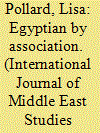

|
|
|
|
|
| Publication |
2014.
|
| Summary/Abstract |
In this article I argue that the Egyptian state emerged as a welfare provider in the mid-20th century, first by depending on the services of charitable societies to feed, educate, and provide medical assistance to the poor, and later by imitating and harnessing the activities of charitable societies. Drawing on correspondence between the state and service societies from the 1880s to 1945, when King Faruq (r. 1936-52) granted the Egyptian Ministry of Social Affairs (MOSA) the authority to define and to circumscribe the activities of social welfare organizations, the article illustrates the interactions of and the similarities between private and state-sponsored charity. The article further suggests that the establishment of MOSA helped to consolidate the hegemony of the Egyptian state over society and, at the same time, exemplified a dialectical process of state formation engaged in by Egyptian heads of state, service organizations, and the Egyptians whose needs they served.
|
|
|
|
|
|
|
|
|
|
|
|
|
|
|
|
| 8 |
ID:
096875


|
|
|
| 9 |
ID:
000666
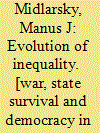

|
|
|
|
|
| Publication |
Stanford, University Press, 1999.
|
| Description |
xx, 349p.
|
| Standard Number |
0804233767
|
|
|
|
|
|
|
|
|
|
|
|
Copies: C:1/I:0,R:0,Q:0
Circulation
| Accession# | Call# | Current Location | Status | Policy | Location |
| 042042 | 323.42/MID 042042 | Main | On Shelf | General | |
|
|
|
|
| 10 |
ID:
123262
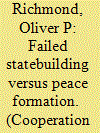

|
|
|
|
|
| Publication |
2013.
|
| Summary/Abstract |
This article outlines the often countervailing forces and norms of state formation, statebuilding and peacebuilding according to their associated theoretical approaches. It introduces a new concept of 'peace formation', which counterbalances a reliance on internal violent or externalised institutions' agency, reform and conditionality. Without incorporating a better understanding of the multiple and often critical agencies involved in peace formation, the states emerging from statebuilding will remain as they are: failed by design. This is because they are founded on externalised systems, legitimacy and norms rather than a contextual, critical and emancipatory epistemology of peace. Engaging with the processes of peace formation may aid international actors in gaining a better understanding of the roots of a conflict, how local actors may be assisted, how violence and power-seeking may be ended or managed and how local legitimacy may emerge.
|
|
|
|
|
|
|
|
|
|
|
|
|
|
|
|
| 11 |
ID:
151844
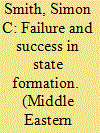

|
|
|
|
|
| Summary/Abstract |
Despite the apparent similarities in Britain's relationship with the Sheikhdoms of the Lower Gulf and the traditional states of southern Arabia, British policy-makers pursued contrasting policies towards the two sets of territories in the era of decolonization. As regards South Arabia, Britain followed a policy of amalgamating the states into a ‘Whitehall’ federation. The fact that the Federation of South Arabia remained dependent on British backing, and in consequence became ineffably associated with British imperialism in an era of anti-colonial Arab nationalism, fatally damaged its chances of longevity. Applying the lessons of failure in South Arabia, the British were far more inconspicuous in the discussions which led to the creation of the United Arab Emirates (UAE). Indeed, the fact that the UAE essentially emerged from the initiative of Sheikhs Zaid of Abu Dhabi and Rashid of Dubai, rather than the British, was one of the key factors in its survival. By contrast, the Federation of South Arabia collapsed ignominiously once the ballast provided by the British had been removed.
|
|
|
|
|
|
|
|
|
|
|
|
|
|
|
|
| 12 |
ID:
164748
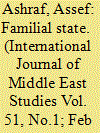

|
|
|
|
|
| Summary/Abstract |
This article examines the social makeup of the early Qajar administration or chancery (dīvān). Using a wide range of Persian sources, the article focuses on those individuals who held offices in the dīvān and traces their family, social, and geographic backgrounds, highlights their marital ties, and reveals their sources of economic and social prestige. In doing so, the article draws attention to patterns of continuity and change between Safavid, Afsharid, Zand, and Qajar rule, and to the familial and informal nature of political power during the early Qajar period (1785–1834). Ultimately the article suggests that an analysis of the social makeup of the dīvān, and of what political office-holders actually do, offers a more fruitful pathway for understanding the formation of Qajar Iran than a focus on institutions and political structures.
|
|
|
|
|
|
|
|
|
|
|
|
|
|
|
|
| 13 |
ID:
177279
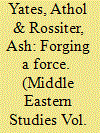

|
|
|
|
|
| Summary/Abstract |
It has long been observed that the development of professional security institutions is a key stage in modern state formation. Leaders of many proto-states embarking on programs of rapid development – such as many of the rulers of the Arab Gulf States in the 1960s – have brought in foreign professional expertise to assist in building up fledgling state institutions, including militaries, police forces and intelligence services. We know little, however, about the relationship between ruler and these key expatriates performing these functions. To help fill this lacuna, this article examines the first three expatriate professional heads of Abu Dhabi Police over the period 1959-68 and their relationship with their paymasters – first Shaikh Shakhbut bin Sultan Al Nahyan, then his brother, Shaikh Zayed. It details the difficulties these professional expatriates faced in operating within this ruler-dominated political-administration system. We believe observations made in this study have relevance to the contemporary Gulf, where governments continue to employ highly skilled expatriates in their security institutions and much else besides.
|
|
|
|
|
|
|
|
|
|
|
|
|
|
|
|
| 14 |
ID:
120305
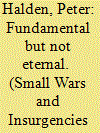

|
|
|
|
|
| Publication |
2013.
|
| Summary/Abstract |
Although the public-private distinction is a historical construction it has been deeply internalized and taken for granted in Western ways of thinking about society and politics. Therefore, we often apply it uncritically as a way to categorizing and coding non-Western societies. Doing so unreflectively may distort our observations as well as policies of state- and peacebuilding. I outline the history of the public-private distinction by emphasizing its role in state-formation processes. This distinction was essential to the formation of the state and society as distinct categories. Indeed, it was and is a pre-condition of the autonomy of the state.
|
|
|
|
|
|
|
|
|
|
|
|
|
|
|
|
| 15 |
ID:
107992


|
|
|
|
|
| Publication |
2011.
|
| Summary/Abstract |
The escalation of violence committed by the Revolutionary Armed Forces of Colombia (FARC) guerrillas against noncombatant civilians triggered a shift in the theoretical orientation of scholars who study Colombia's political economy. While previous explanations emphasized the sociopolitical "grievances" underlying guerrilla activities, recent explanations emphasize the "greed" motive, including guerrilla involvement in Colombia's illegal narcotics trade. In this article, the author posits an alternative explanation using Charles Tilly's theories of state formation to explain FARC activities in Caquetá, Colombia. Drawing from a longitudinal data set that documents the war making, state making, extraction, and protection activities of the FARC between 1975 and 2007, in addition to historical sociological methods, the author finds that increases in FARC repression stem from the growing militarization and paramilitarization of the region, which pressured the FARC to extract resources from the local population in a way that no longer served that population's legitimate protection interests.
|
|
|
|
|
|
|
|
|
|
|
|
|
|
|
|
| 16 |
ID:
077893
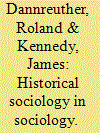

|
|
|
|
|
| Publication |
2007.
|
| Summary/Abstract |
While historical sociology (HS) has declined in the UK, its position in the United States is much more secure. This article analyses the divergent paths of HS in both the UK and the US in order to provide some lessons for international relations (IR) in both countries. The article argues that HS in the US has been more successful in defining its particular contribution - the pursuit of important, macro-oriented research. The main benefit that HS can bring to IR is the provision of this 'intellectual space' allied to an engagement with 'big issues'. The article traces such a contribution in three areas: the state, civil society and democratization; nationalism and ethnic conflict; and Islam and the Middle East. The article concludes by arguing that the adoption of HS may have the added benefit of transcending the exigencies of the present-day and the parochialism of Western and Eurocentric concerns found in much contemporary IR
|
|
|
|
|
|
|
|
|
|
|
|
|
|
|
|
| 17 |
ID:
147550
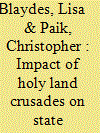

|
|
|
|
|
| Summary/Abstract |
Holy Land Crusades were among the most significant forms of military mobilization to occur during the medieval period. Crusader mobilization had important implications for European state formation. We find that areas with large numbers of Holy Land crusaders witnessed increased political stability and institutional development as well as greater urbanization associated with rising trade and capital accumulation, even after taking into account underlying levels of religiosity and economic development. Our findings contribute to a scholarly debate regarding when the essential elements of the modern state first began to appear. Although our causal mechanisms—which focus on the importance of war preparation and urban capital accumulation—resemble those emphasized by previous research, we date the point of critical transition to statehood centuries earlier, in line with scholars who emphasize the medieval origins of the modern state. We also point to one avenue by which the rise of Muslim military and political power may have affected European institutional development.
|
|
|
|
|
|
|
|
|
|
|
|
|
|
|
|
| 18 |
ID:
193603


|
|
|
|
|
| Summary/Abstract |
This article examines the durable, yet largely overlooked, claims of Bahu Begam (1727–1815) to dynastic wealth and authority in the Awadh nawabi (1722–1856), a North Indian Mughal ‘successor state’ and an important client of the East India Company. Chief consort (khass mahal) to Nawab Shuja-ud-Daula (r. 1754–75) and mother to his successor Nawab Asaf-ud-Daula (r. 1775–97), Bahu Begam played a well-documented role in the regime’s tumultuous politics, particularly during Warren Hastings’s tenure as the Company’s governor-general (1773–85) and his later parliamentary impeachment. But despite her prominent political influence, little attention has been paid to the substance of her persistent claims to proprietorship over revenue rights and the immense fortune in her custody, as well as her broader assertions of authority over Awadh’s male rulers. Taking those claims seriously, this article contends that the begam rooted her arguments in notions of natural deference to maternal authority and generational seniority, evolving dynastic traditions of co-sharing sovereignty and fiscal resources, and her particular history as a principal financier of the Awadh regime. In so doing, the article argues that the begam’s claims reflect the shifting conceptual language of late-Mughal Persianate political discourse and the ambivalent position of elite women as dynastic financiers and state-builders in early colonial South Asia.
|
|
|
|
|
|
|
|
|
|
|
|
|
|
|
|
| 19 |
ID:
124435
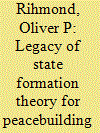

|
|
|
|
|
| Publication |
2013.
|
| Summary/Abstract |
The mainstream literature on state formation has provided the basis for peacebuilding and statebuilding praxes to focus on power and realist concepts of security and the state. The dominant focus on violence and how it shapes the state has been an important motif of peacebuilding and statebuilding literatures. However, state formation literatures also offer sociological, anthropological, and structural accounts as a basis for a post-colonial framework for peace, security, and order, which expose the limits of peacebuilding and statebuilding.
|
|
|
|
|
|
|
|
|
|
|
|
|
|
|
|
| 20 |
ID:
168821
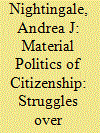

|
|
|
|
|
| Summary/Abstract |
Examining the boundaries of state–society–citizen–environment after the federal restructuring in Nepal, we ask how do people claim authority or citizenship rights? We theorise state power through the socio-environmental state framework as a set of socio-natural relations in the making, formed by struggles over authority, recognition and environment. Using qualitative data from Barpak, the epicentre of the 2015 earthquake, we capture the politics of natural resource governance that (re)emerged during earthquake reconstruction and local-level elections, illustrating how control over resources is negotiated, disputed, and inscribed in law (land titles and water sources) and landscapes (water sources, earthquake resettlement area, an open-air museum).
|
|
|
|
|
|
|
|
|
|
|
|
|
|
|
|
|
|
|
|
|